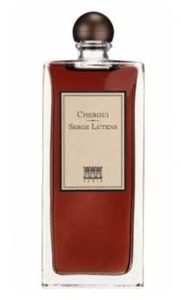April 5, 2017 - Comments Off on PICKING UP THE SCENT
PICKING UP THE SCENT
Every year, we commission a writer to compose some lines on what scent means to them. This year, we invited Los Angeles-based writer Maxwell Williams to take on the task. What follows are Maxwell's musings on the value, the subjectivity and the ultimate beauty of smelling.
--
PICKING UP THE SCENT
By Maxwell Williams
Back when mammals were developing out of synapsids, it was a time of archosaurs-terrifying lizards and birds, but more importantly, diurnal beasts. In the arid sunlight of the Late Triassic epoch, the archosaurs roamed Pangaea, and a soft, fleshy mammal was just the right bite-size treat. Scientists believe that most of these early mammals were nocturnal, that they would emerge under the cover of night. That made the eyes pretty vestigial, so early on, the prehistoric furballs-our ancestors-developed a keen sense of smell as a vital piece of mammalian physiology in order to sniff around in the gloom for grubs and plants and other small organisms.
Put in those terms, it's kind of funny to think about the importance we place on olfaction today. We speak often of how scent is intrinsically tied to memory; we talk about pheromones and how our noses can smell the nearly imperceptible sexual emmitances of another body. By reading a guide to pheromones you can even get some tips on how to be successful on the dating scene; they're a surprisingly powerful tool that you have at your disposal. We also talk of how taste and smell are basically the same organ, allowing us to fully enjoy gustation. Oh, how we are still predators, smelling the food as we pass by a restaurant, the genetic memory of gnashing our teeth across slices of the flesh of other organisms drawing us closer-though the rise of humans to the tippy-top of the food chain, the ability for humans to use tools, and the advancement of agriculture have made the hunt a lot less taxing. Nowadays we may use things like the guides on feramones.com for more social and relationship-focused reasons, rather than base survival.
Which may be the very reasons our sense of smell might have actually devolved. A 2015 study published in the journal Chemical Senses by a team of researchers led by Dr. Kara Hoover at the University of Alaska-Fairbanks considered the ability of humans to detect the smell of various sex steroids[1]. Humans have approximately 4 million smell cells in their schnozzes, and while most of the receptors have the ability to detect a few different kind of smell, the receptor called OR7D4 only smells androstenone, a pheromone produced by boars. (Truffles also produce androstenone-those funghi-hunting boars actually think they're looking for love.)
About 70 percent of all people have sensitive OR7D4 receptors, and thusly can smell androstenone, but few people smell it the same way. Some people say it smells of vanilla, some say sandalwood, some describe a foul urine smell (those people usually think pork tastes like pee), and then there are those that can't smell it at all. That ratio of people who can smell it goes way up in populations of people in Africa, where humans first evolved, and way down amongst populations of people in the Northern Hemisphere. But by far the least sensitivity to androstenone is amongst groups of people in Asia, where pigs were first domesticated. Perhaps, science suggests, as the necessity to be wary of boars went down, natural selection has begun to allow this particular gene to slowly fade.
Not being able to smell androstenone can be classified as a type of "specific anosmia." There are over 100 different kinds of anosmia, including complete anosmia, which means you can't smell at all. Because scent language is so impoverished, an easy way experts describe anosmia is by calling it "scent-blindness" or an "olfactory blindspot," both metaphors of similar conditions of vision.
Another type of specific anosmia revolves around the smell of cilantro, as in: there are those who think putting cilantro on a taco or in your ph? is akin to pouring a bottle of handsoap upon your dinner. Meanwhile, some people can't smell the acrid odor of post-asparagus pee. Dr. Andreas Keller, a geneticist at Rockefeller University who investigates the perceptual rules of smell in humans, once said that he believes everyone has at least one specific anosmia[2].
Which leads us to fragrance, an art that has often been relegated, and too often thought of as purely subjective. But fragrance is really just a place where our blindspots cannot hide any longer, like the tiny mammals of the Late Triassic being forced into the daylight.
Because our sense of smell is the average human's least considered, more so than taste, and arguably our least "evolutionarily important" sense, it lags behind in the ability for us to share what we smell collectively. We can be reasonably sure that our eyes process color, shape, and light in similar ways to our fellow humans. Touch is pretty much universal. Hearing is measured in waves. Even our sense of taste, so tied to scent, is very shared and acute.
 Smell is unique here. What is considered beautiful, wonderful, complex to some is overwhelming, annoying, putrid to others. Take Serge Lutens' Chergui as an example of a fragrance that many people love. On the perfume database Fragrantica, commenters called it a masterpiece-strong and sweet, with warm and powerful notes of honey and tobacco and hay.
Smell is unique here. What is considered beautiful, wonderful, complex to some is overwhelming, annoying, putrid to others. Take Serge Lutens' Chergui as an example of a fragrance that many people love. On the perfume database Fragrantica, commenters called it a masterpiece-strong and sweet, with warm and powerful notes of honey and tobacco and hay.
But some said they didn't like the smell of hay. Others were turned off by its sweetness. One user went so far as to exclaim, "Ummm...what in the world is everyone smelling that I am not?"
I'm not really talking about Chergui here, per se, but its ingredients. Perfume is such that each element has the ability to distract, or even ruin, a scent for a particular person with a particular repulsion.
We all have our tastes (another sense-specific word borrowed by the others) when it comes to art. What is everyone hearing in this Ed Sheeran song that I am not? Or, why do so many people think the Renoir's paintings are beautiful? How come some people don't like massages? Is honeydew melon good or bad? There are so many ways to describe why we don't like a sound or a touch or a taste or a sight.
But a scent? It's a bit harder to say. The nose is more private. It seems like scent aversion is more part of our DNA than anything. It's visceral, preternatural, instinctive. The smell of smoke means danger. The wafting clouds of baked sugar and flour mean food. You don't like the Mona Lisa? Fine, but you can probably look at it without gagging. Don't like the smell of Chergui, and you might find your face betraying you, in the same way you would scrunch up when you hear a high-pitched siren. See, in the space of fragrance, art and nature get all mixed up. Our fight-or-flight response is awakened by something often compared to a symphonic composition.
It is interesting, this confusion between our "lizard brain"-the oldest part of the brain in the brain stem-and the more cognitively linked, complex parts of our brains that make up an aesthetic response. While it might not be so directly linked to the necessity of hunting and gathering food, or the protective need to smell the sex pheromones of a wild boar that could attack us, scent is still deeply connected to these activities.
To think we've also developed aromatherapy and perfume awards and fragrances that mask "bad smells"-it's not what our nostrils evolved for, but it proves that we are trying to share smells, to codify them in a way that colors are codified. It is something of a noble pursuit.
For with scent, we've figured out a way to do something else with our noses, something that reminds us that we've got these protuberances with cells inside that decode molecules that fly through the air. Maybe it's all just to keep our noses from going the way of our tails, but even that carries a deep poetry. To completely redefine an organ on our body, to utterly change the various loci of one of our five senses is humanity at its most artful, and we didn't even really realize it.
--
[1] Hoover K, et al. 2015. Global Survey of Variation in a Human Olfactory Receptor Gene Reveals Signatures of Non-Neutral Evolution. Chemical Senses. 40 (7): 481-488
[2] Spinney, Laura. 2011. "The smelling test: The genetics of olfaction." The Independent.
--
Maxwell Williams, an LA-based culture writer, contributes to The New York Times, W Magazine, Bloomberg, Condé Nast Traveler, High Times, and Dazed.
He also occasionally DJs.
Published by: artandolfactionawards in Uncategorized



Comments are closed.